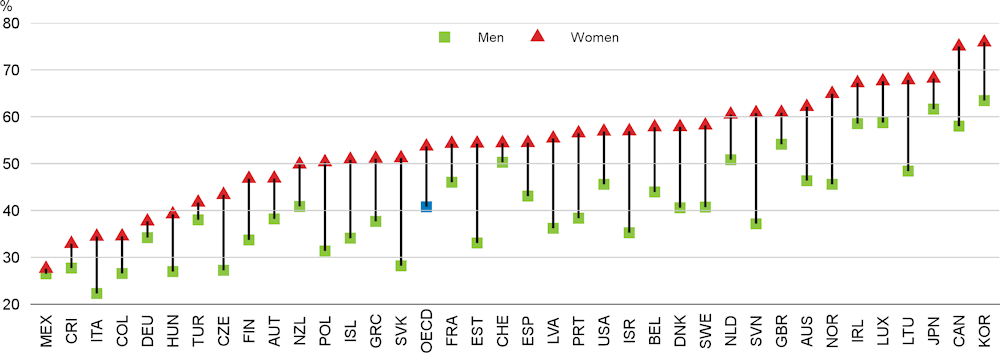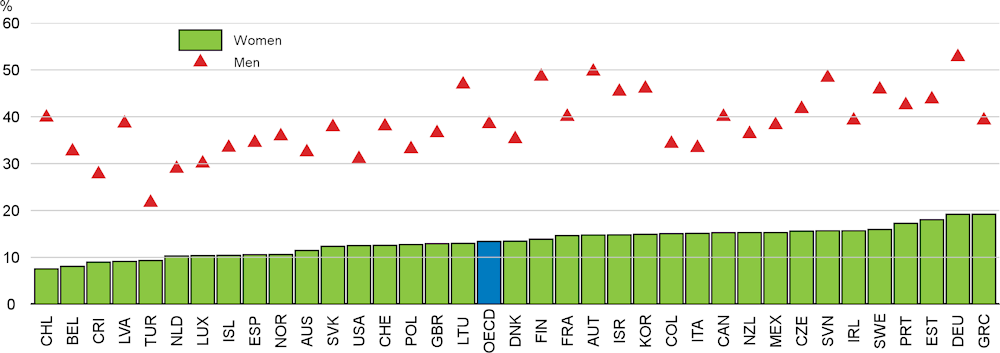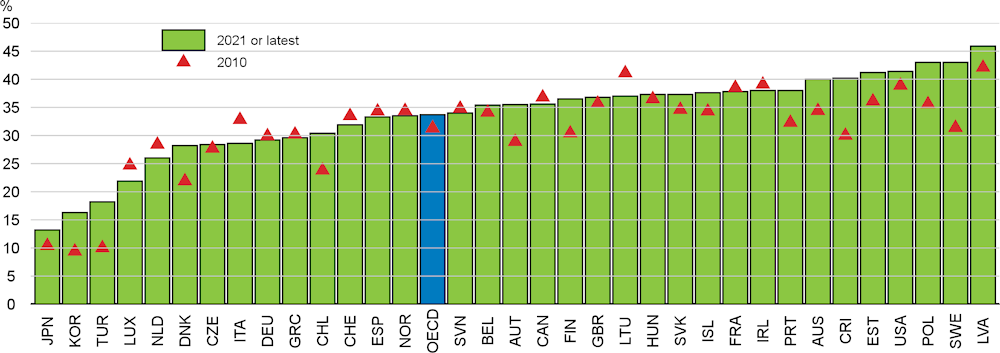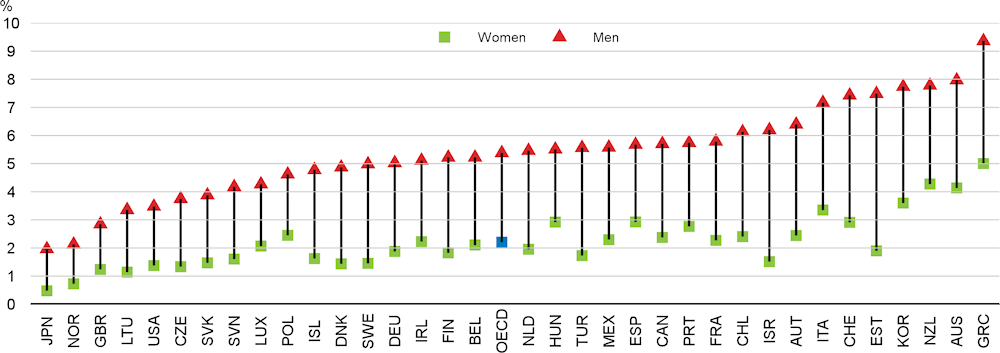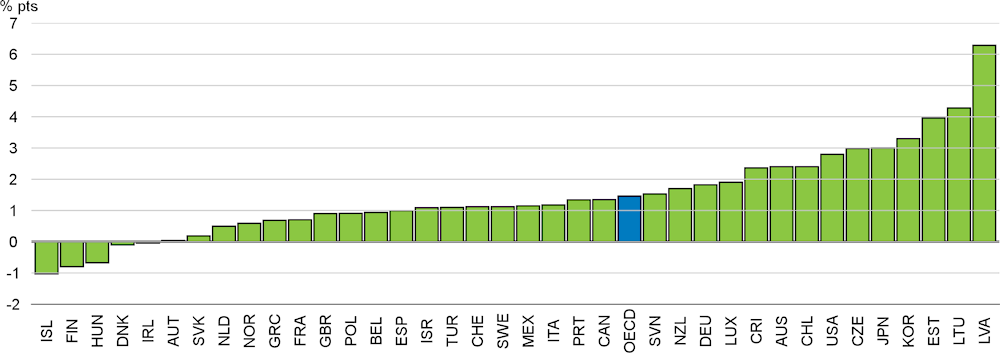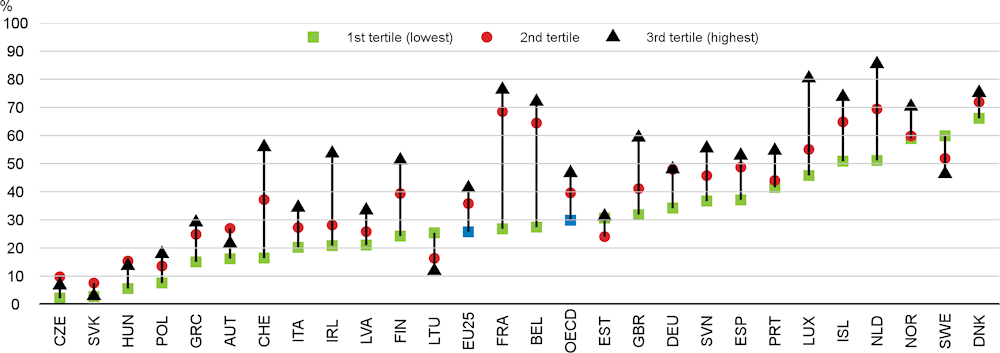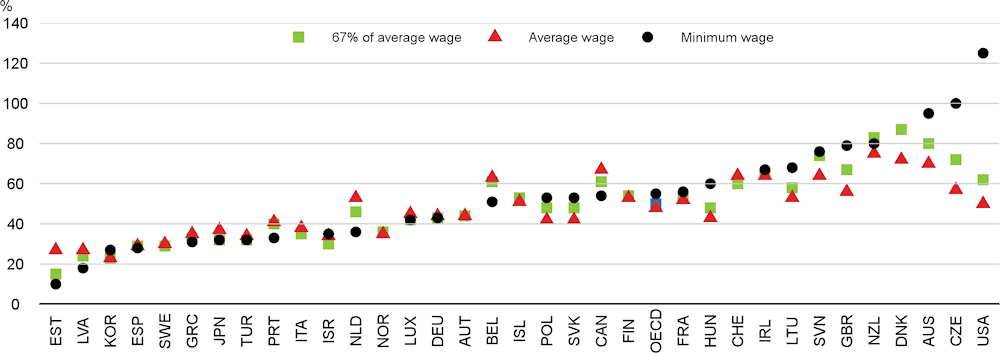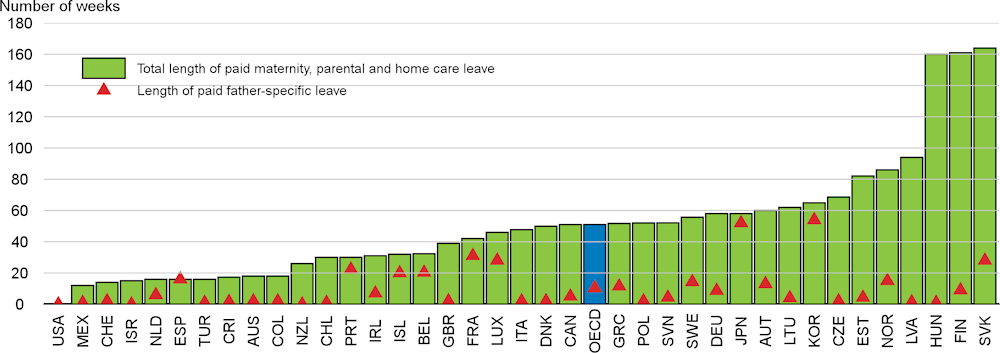Adema, W., Clarke, C., Thévenon, O. (2020), “Family Policies and Family Outcomes in OECD Countries”, In: Nieuwenhuis, R. and W. Van Lancker (eds), The Palgrave Handbook of Family Policy, Palgrave Macmillan, Cham.
Bettio, F. and A. Verashchagina (2009), Gender Segregation in the Labour Market, Root Causes, Implications and Policy Responses in the EU, European Commission, Directorate-General for Employment, Social Affairs and Equal Opportunities.
Brussino, O. and J. McBrien (2022), “Gender stereotypes in education: Policies and practices to address gender stereotyping across OECD education systems”, OECD Education Working Papers, No. 271, OECD Publishing, Paris.
Carlana, M. (2019), “Implicit Stereotypes: Evidence from Teachers’ Gender Bias”, The Quarterly Journal of Economics, 134(3), 1163-1224.
Causa, O. et al. (2023), “Lost in the green transition? From measurement to stylized facts”, OECD Economics Department Working Papers, OECD Publishing, Paris, forthcoming.
Causa, O., N. Luu and M. Abendschein (2021), "Labour market transitions across OECD countries: Stylised facts", OECD Economics Department Working Papers, No. 1692, OECD Publishing, Paris.
Causa, O. and Å. Johansson (2010), "Intergenerational Social Mobility in OECD Countries", OECD Journal: Economic Studies, vol. 2010/1.
Cavalcanti, T. and J. Tavares (2016), “The Output Cost of Gender Discrimination: A Model-Based Macroeconomics Estimate, The Economic Journal, 126, 109-134.
Charlton, E. (2023), “This is why women are bearing the brunt of the cost of living crisis, according to research”, World Economic Forum.
Ciminelli, G., C. Schwellnus and B. Stadler (2021), “Sticky floors or glass ceilings? The role of human capital, working time flexibility and discrimination in the gender wage gap”, OECD Economics Department Working Papers, No. 1668, OECD Publishing, Paris,
Criscuolo, C, P Gal, T Leidecker and G Nicoletti (2021), "The human side of productivity: Uncovering the role of skills and diversity for firm productivity", OECD Productivity Working Papers No. 29, OECD Publishing, Paris.
Cuberes, D., and M. Teignier (2016). “Aggregate Effects of Gender Gaps in the Labor Market: A Quantitative Estimate”. Journal of Human Capital, 10(1), 1-32.
Curtis, M., C. Schmid and M. Struber (2012), “Gender diversity and corporate performance”, Credit Suisse Research Institute, Zurich.
Denis, E. (2022), “Enhancing gender diversity on boards and in senior management of listed companies”, OECD Corporate Governance Working Papers, No. 28, OECD Publishing, Paris.
Duflo, E. (2012), “Women empowerment and economic development”, Journal of Economic Literature, 50(4), 1051-79.
Encinas-Martín, M. and M. Cherian (2023), Gender, Education and Skills: The Persistence of Gender Gaps in Education and Skills, OECD Skills Studies, OECD Publishing, Paris.
European Parliament (2023), “Gender aspects of energy poverty”.
Galinsky, A. et al. (2015), “Maximizing the gains and minimizing the pains of diversity: a policy perspective”, Perspectives on Psychological Science, 10(6).
Goodman, L., J. Zhu and B. Bai (2016), “Women Are Better than Men at Paying Their Mortgages”, Urban Institute Research Report, Washington, DC.
Harding, M., D. Paturot and H. Simon (2022), "Taxation of part-time work in the OECD", OECD Taxation Working Papers, No. 57, OECD Publishing, Paris.
HM Treasury (2023), Spring Budget 2023, Policy Paper, London.
Hung, A., J. Yoong and E. Brown (2012), "Empowering Women Through Financial Awareness and Education", OECD Working Papers on Finance, Insurance and Private Pensions, No. 14, OECD Publishing, Paris.
Kleven, H., C. Landais, J. Posch, A. Steinhauer and J. Zweimüller (2019), “Child Penalties across Countries: Evidence and Explanations”, AEA Papers and Proceedings, 109, 122-26.
Lassébie, J., et al. (2019), “Levelling the playing field: Dissecting the gender gap in the funding of start-ups”, OECD Science, Technology and Industry Policy Papers, No. 73, OECD Publishing, Paris.
Levanon, A., P. England and P. Allison (2009), “Occupational feminization and pay: assessing causal dynamics using 1950-2000 U.S. Census data”, Social Forces, 88(2), 865-892.
Lusardi, A. and O.S. Mitchell (2008), “Planning and Financial Literacy: How Do Women Fare?”, American Economic Review, 98 (2), 413-17.
Maravalle, A. and A. González Pandiella (2022), “Expanding access to finance to boost growth and reduce inequalities in Mexico”, OECD Economics Department Working Papers, No. 1717, OECD Publishing, Paris.
Noland, M., T. Moran and B. Kotschwar (2016), “Is gender diversity profitable? Evidence from a global survey”, Peterson Institute for International Economics Working Paper Series, No. 16-3, Washington DC.
OECD (2023a), Joining Forces for Gender Equality: What is Holding us Back?, OECD Publishing, Paris.
OECD (2023b), Job Creation and Local Economic Development 2023: Bridging the Great Green Divide, OECD Publishing, Paris.
OECD (2023c), Economic Policy Reforms 2023: Going for Growth, OECD Publishing, Paris, forthcoming.
OECD (2023d), OECD Economic Surveys: Australia 2023, OECD Publishing, Paris, forthcoming.
OECD (2023e), Gender pay gap reporting in OECD countries: Guidance for implementation and monitoring, OECD Publishing, Paris, forthcoming.
OECD (2023f), OECD Economic Surveys: Sweden 2023, OECD Publishing, Paris, forthcoming.
OECD (2023g), “OECD Best Practices for Gender Budgeting”, OECD Journal on Budgeting, Vol. 23/1.
OECD (2022a), “Same skills, different pay: Tackling Gender Inequalities at firm level”, OECD, Paris.
OECD (2022b), Education at a Glance 2022: OECD Indicators, OECD Publishing, Paris.
OECD (2022c), Tax Policy and Gender Equality: A Stocktake of Country Approaches, OECD Publishing, Paris.
OECD (2022d), OECD Economic Surveys: United Kingdom 2022, OECD Publishing, Paris.
OECD (2021a), Towards Improved Retirement Savings Outcomes for Women, OECD Publishing, Paris.
OECD (2021b), Pensions at a Glance 2021: OECD and G20 Indicators, OECD Publishing, Paris.
OECD (2021c), Entrepreneurship Policies through a Gender Lens, OECD Studies on SMEs and Entrepreneurship, OECD Publishing, Paris.
OECD (2021d), OECD Economic Surveys: Sweden 2021, OECD Publishing, Paris.
OECD (2020a), “Women at the core of the fight against COVID-19 crisis”, OECD Policy Responses to Coronavirus (COVID-19), OECD, Paris.
OECD (2020b), OECD Employment Outlook 2020: Worker Security and the COVID-19 Crisis, OECD Publishing, Paris.
OECD (2020c), How's Life? 2020: Measuring Well-being, OECD Publishing, Paris.
OECD (2020d), “Distributional risks associated with non-standard work: Stylised facts and policy considerations”, Tackling Coronavirus Series, OECD, Paris.
OECD (2020e), “How to strengthen the integration of migrant women?”, Migration Policy Debates, N°25, OECD, Paris.
OECD (2019), The Role of Education and Skills in Bridging the Digital Gender Divide, Evidence from APEC Economies, OECD, Paris.
OECD (2018a), A Broken Social Elevator? How to Promote Social Mobility, OECD Publishing, Paris.
OECD (2018b), Early Learning Matters, OECD, Paris.
OECD (2018c), Bridging the Digital Gender Divide, Include, Upskill, Innovate, OECD, Paris.
OECD (2017), The Pursuit of Gender Equality: An Uphill Battle, OECD Publishing, Paris.
OECD (2015), OECD Toolkit for Mainstreaming and Implementing Gender Equality, Implementing the 2015 OECD Recommendation on Gender Equality in Public Life, OECD, Paris.
OECD (2013a), Women and Financial Education: Evidence, Policy Responses and Guidance, OECD Publishing, Paris.
OECD (2013b), Addressing women’s needs for financial education, International Network on Financial Education (INFE), OECD, Paris.
OECD (2011), Taxation and Employment, OECD Tax Policy Studies, No. 21, OECD Publishing, Paris.
Périvier, H. (2014), “Men and women during the economic crisis. Employment trends in eight European countries”, Revue de l'OFCE, 133(2), 41-84.
Stevenson, B. (2021), “Women, work, and families: recovering from the pandemic-induced recession”, Economic analysis, Hamilton Project, Washington DC.
Swedish National Mediation Office (2021), Wage Differences Between Women and Men 2020, Stockholm.
Touzet, C. (2023), "Teleworking through the gender looking glass: Facts and gaps", OECD Social, Employment and Migration Working Papers, No. 285, OECD Publishing, Paris.
Woolley, A. et al. (2010), “Evidence for a collective intelligence factor in the performance of human groups”, Science, Vol. 330(6004).






